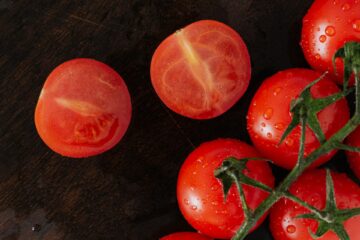A Salad A Day For Better Sex
5 Steps To A Salad For Better Sexual & Overall Health
A salad a day keeps the doctor away.
Vegetables are the most important foods for human health, which means they are also the most important foods for sexual health because when your body is working well, your sexual function tends to follow suit.
Canada’s Food Guide recommends most people eat eight to 10 servings of fruits and vegetables per day for optimal health. But right now, less than half of Canadians are having more than five daily servings.
Many people I see in private practice blame a lack of time and lack of preparedness for their less-than-ideal vegetable intake.
If this sounds like you, salads are a great solution.
Salads just aren’t about vegetables though, so in today’s article I will introduce you to the five ingredients that, when combined, make the ultimate salad for sexual health.
1. The Base – Kale or Spinach
Dark leafy greens like kale and spinach are among the most nutrient and antioxidant dense foods a person can eat. They also happen to be very high in potassium, which is a key component in blood pressure regulation. High blood pressure is one of the most common reasons why Canadians are prescribed medication and also a significant risk factor for erectile dysfunction – so fight back with salads!
Alternatives: Arugula, spring mix.
2. The Second Vegetable – Tomatoes
In my books, a truly solid salad needs at least two different types of vegetables. Affordable and widely available, tomatoes are the perfect complement to your leafy green base. They are also the richest natural source of a very important compound known as lycopene, which may help prevent prostate cancer (Chen et al 2015). The effect of cancer and its treatment on sexual health can have both short and long-term implications for your sex life. Prostate cancer is the most common male cancer, and a strong diet plays a role in prevention.
Alternatives: Bell peppers, especially red.
3. The Healthy Fat – Almonds and other Tree Nuts
Guess what can screw with your sex life? High cholesterol. Guess what can help lower your cholesterol? Almonds and other nuts.
Almonds, just like other nuts, are also a good source of dietary magnesium. Many Canadians don’t get enough magnesium in their diet, yet it is known as an important mineral in blood pressure control (Han et al 2017).
Alternatives: Avocado, any types of seeds, olive oil.
4. The Protein – Lentils
Did you know that legumes, such as lentils, are explicitly identified in the 2018 Canadian Diabetes Association practice guidelines as a food that can help with blood sugar control in diabetes? Why does this matter to you?
Well, one in 10 Canadians are living with diabetes and poor blood sugar control is a very common cause of erectile dysfunction. Diabetes does not have to ruin your sex life though, and regularly incorporating legumes, such as lentils, can go a long way to stop that from happening (Diabetes Canada 2018).
Alternatives: chickpeas, tofu/canned salmon, or tuna if you can’t tolerate legumes.
5. The Finishing Touch – Orange Slices
Adding fruit to your salad is SO 2018, but adding orange slices does more than just help you fit in with trends. Oranges are a rich source of soluble fibre, the key ingredient that contributes to both blood sugar and blood cholesterol control (Ramprasath et al 2014).
They are also a rich source of vitamin C, which will help your body to better absorb the iron found in your lentils (or other legumes).
Alternatives: strawberries or other berries, kiwi.
The Sexercise Connection
Healthy eating fuels good sexual performance and makes it easy to enjoy the health benefits of Sexercise that come with regular workouts in and out of the bedroom.
Final Thoughts
I strongly believe a salad a day that includes the diverse array of healthy ingredients discussed in this article will help most people fix the nutrient gaps in their diet.
Doing so will inevitably improve their overall health and sexual health by preventing many of the common issues associated with an unbalanced diet that tend to affect both.
Source
Han, H., Fang, X., Wei, X., Liu, Y., Jin, Z., Chen, Q., … Cao, Y. (2017). Dose-response relationship between dietary magnesium intake, serum magnesium concentration and risk of hypertension: a systematic review and meta-analysis of prospective cohort studies. Nutrition Journal, 16, 26. DOI: http://doi.org/10.1186/s12937-017-0247-4
Chen, P., Zhang, W., Wang, X., Zhao, K., Negi, D. S., Zhuo, L., … Zhang, X. (2015). Lycopene and Risk of Prostate Cancer: A Systematic Review and Meta-Analysis. Medicine, 94(33), e1260. DOI: http://doi.org/10.1097/MD.0000000000001260
Diabetes Canada Clinical Practice Guidelines Expert Committee. Diabetes Canada 2018 Clinical Practice Guidelines for the Prevention and Management of Diabetes in Canada. Can J Diabetes. 2018;42(Suppl 1): S1-S325.
Ramprasath, V. R., Jenkins, D. J., Lamarche, B., Kendall, C. W., Faulkner, D., Cermakova, L., … Jones, P. J. (2014). Consumption of a dietary portfolio of cholesterol lowering foods improves blood lipids without affecting concentrations of fat-soluble compounds. Nutrition Journal, 13, 101. DOI: http://doi.org/10.1186/1475-2891-13-101



0 Comments